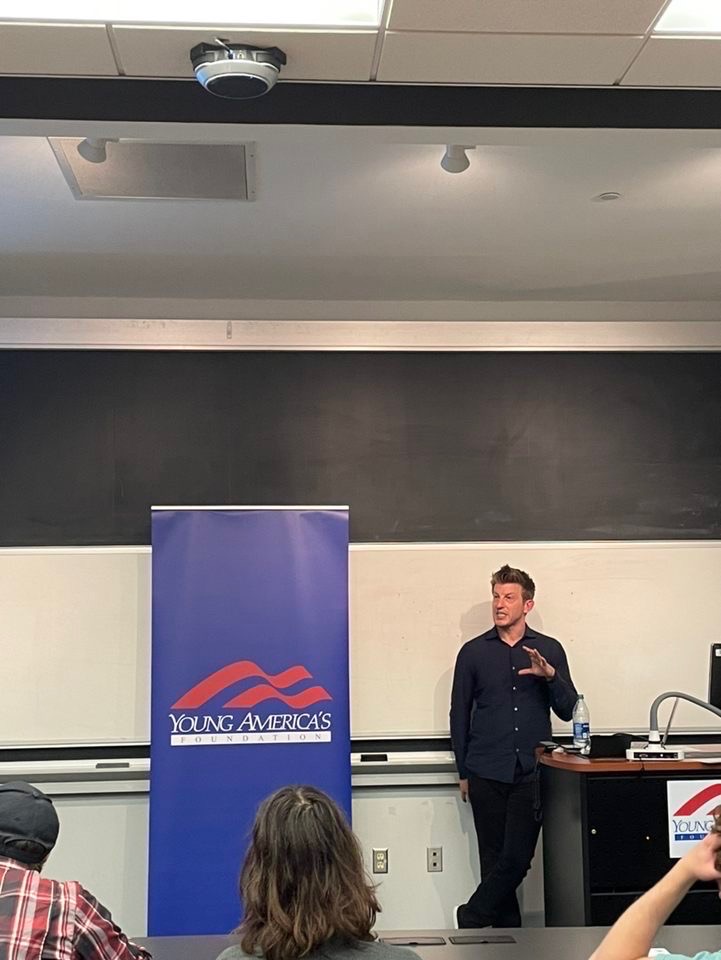By Jake Gramanz, Staff Writer

Alex Epstein talking to students during his lecture (Photo Jake Gramanz/The Gettysburgian)
On Thursday, the Gettysburg College Young Americans for Freedom (YAF) hosted guest speaker Alex Epstein. Epstein is a philosopher from Duke University and an advocate for the advanced use of fossil fuels to further develop humanity’s potential living standard.
Epstein began his talk with a question for the audience: “What is the most popular moral idea today?”
A variety of students gave thoughts ranging from “help others” or “don’t do to others what you wouldn’t want done to yourself.” Epstein claimed that the greatest moral idea today is “what most governments, corporations, and cultural institutions advocate strongly and most consistently: the rapid elimination of fossil fuels.”
Epstein cited the recent United Nations Intergovernmental Panel on Climate Change, which came out with a report that Epstein summarized as, “We need to get rid of fossil fuel use.”
Epstein said that the most commonly held belief by large institutions is that we need to eliminate fossil fuel use by the year 2050 to become carbon neutral.
Epstein contends this belief. “We should be using more fossil fuels in better places to advance human flourishing,” he said.
Epstein noted, “What I’m arguing is not in disagreement with most of the expert researchers who study these issues.”
Epstein explained that he is “challenging the way we put this data together.” Epstein said that he believes the policy makers who represent the expert researchers are putting the data together in an “irrational” way. Epstein argued that his interpretation of this data is not one people tend to disagree with.
“What’s interesting about this way of thinking is that nobody has ever disagreed with my way of thinking about it,” Epstein said.
One of Epstein’s main disagreements regarding fossil fuels is directly addressed at policy makers, whom he believes do not properly address the benefits of fossil fuels. He compared fossil fuels to pharmaceutical drugs in that people must “weigh the benefits against the side effects.”
Epstein detailed his main points surrounding fossil fuels: fossil fuel’s benefits, fossil fuels climate mastery benefits and the climate impacts of fossil fuels. He then further compared fossil fuels to pharmaceutical drugs.
“I’d be like you have a life saving prescription drug with these huge benefits and it has modest side effects and people act like the side effects are the end of the world,” Epstein said. “My contention is that you apply these principles of weighing the benefits and the side effects with the known facts about fossil fuels that almost everyone agrees with.”
“The method that everyone agrees to, but almost nobody follows is carefully weighing the benefits, and I believe that if we use that method, we’re going to come up with much better conclusions,” Epstein said.
Epstein then opened the floor to questions.
One student asked, “You claimed that people tend to sensationalize the negative effects of fossil fuels and neglect the positive effects. What motive would the scientific community have for deceiving people like that?”
Epstein said that his claims are consistent with what most expert researchers think yet not consistent with those who represent the experts.
“What happens is there’s a set of institutions and people that kind of process what the research has come up with, then there’s a stage of synthesis, where you try to take a vast amount of research and synthesize it together and decide what’s relevant and what’s best,” Epstein said. “And so the synthesizers can make a big mistake like I mentioned with the UN: the synthesizing bodies take from climate research, but they ignore the benefits of fossil fuels.”
Another student asked, “You said that policymakers are misrepresenting what scientists say regarding this issue, but for the most part scientists side with the policymakers whenever they voice their opinion. What do you have to say to that?”
Epstein answered, “One thing with a lot of climate science is it’s hard to know it’s predictive. Our experience of climate is totally based on our level of mastery.”
